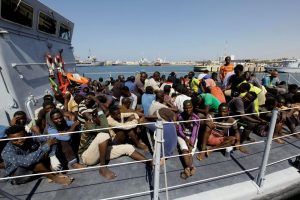It’s 5.30am, and under a pinkish sky in waters north of Libya, the crew of Aquarius, a ship chartered by the French-German NGO SOS Méditerranée is preparing to bring on board 741 migrants who had been rescued by an offshore supply vessel a day earlier.
A rib boat shuttles back and forth, bringing to safety a dozen or so shell-shocked looking women, some heavily pregnant or with burns due to oil spills on cheaply-made rubber boats, a three-month-old baby, and men suffering from scabies.
The process takes around four hours, but there is no time to rest: soon after, the team is called to rescue almost 200 more people crammed into two rubber boats floating nearby.
Aquarius had left the port of Pozzallo in Sicily about 24 hours earlier. Before each journey, the crew of around 35 people, made up of medics and volunteers, never knows what to expect. Sometimes they wait for days before making a rescue.
On this particular day, June 27th, they saved 1,032 people – a new record since the ship started search and rescue operations in the Mediterranean in 2015.
It took a further 48 hours for the ship to return to Italy, with the team working relentlessly to assist migrants, who spent the two nights spread out on the ship’s decks.
It was during this time the weary crew heard about Italy’s threat to close the country’s ports unless the EU helped shoulder the burden of a migrant crisis that has worsened in recent months: the number arriving on Italy’s southern shores increased by 70 percent during the first six months of this year compared to the same period in 2016. An estimated 2,000 people drowned along the way.
Crew members described Italy’s move as a “cry for help” from the EU. But the plea was swiftly ignored, with both France and Austria deploying measures to ensure migrants remain in Italy.
The NGOs themselves have shouldered much criticism in recent months. In May, Carmelo Zuccaro, a Sicilian magistrate, told a government committee that there are people among them who are “not exactly compatible with philanthropists”. Unsurprisingly, politicians from Italy’s far-right Northern League and the populist Five Star Movement seized upon his comments, suggesting that the rescue ships are little more than a taxi service across the sea.
That couldn’t be further from the truth. It’s not easy to get a place aboard Aquarius. Furthermore, it’s dangerous. It’s not unusual for the ships to be shot at when in waters close to Libya. Last September the Libyan navy admitted to staging an attack that saw the rescue ship Bourbon Argos pelted with bullets. The crew hid in a safe room, thinking the attackers would seize them or sink the boat.
A similar scene unfolded aboard Aquarius in May when the Libyan coastguard arrived during a rescue, raised their guns to the sky and pulled the trigger – a tactic used to panic migrants in an attempt to bring them back to Libya.
The crew also works relentlessly with a huge risk to their health.

